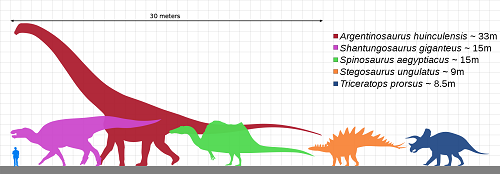Day, S., Dinomania. Geoscientist 30 (3), 5, 2020
https://doi.org/doi: 10.1144/geosci2020-073, Download the pdf here
 If there’s one thing I could be sure of, during my ten plus years as a geological press officer, it was that dinosaur stories were a sure thing. Nothing else – not climate change, earthquakes, not even ‘is the magnetic pole about to flip?’ – came close. I didn’t often get them – the meatier dinosaur papers were often snapped up by a university press office long before I could get my hands on them – but when I did, I knew someone would cover them.
If there’s one thing I could be sure of, during my ten plus years as a geological press officer, it was that dinosaur stories were a sure thing. Nothing else – not climate change, earthquakes, not even ‘is the magnetic pole about to flip?’ – came close. I didn’t often get them – the meatier dinosaur papers were often snapped up by a university press office long before I could get my hands on them – but when I did, I knew someone would cover them.
I even managed to spin the less obviously news worthy stories to accommodate them – on the publication of the Society’s Transactions of the Geological Society (1811-1856) online, I went with ‘Charles Darwin was crazy about dinosaurs’, after spending a happy hour or so combing through the archives and searching for accessible names and topics. (It was, admittedly, a pity that the mobile version of one particular news site temporarily cut off the last two words of the headline.)
I don’t know about Darwin, but for many of us, the obsession starts young. Anyone who’s met a five year old will know that their encyclopedic knowledge of every species and its habits can be bafflingly accurate. This is, according to psychologists, an example of an ‘intense interest’ common among children – dinosaurs rank high, alongside trains, planes and cars. (I think the particular article I read may have been published before Frozen came out.)
Personally – and I know this will shock many – I wasn’t that into dinosaurs as a child. Since working for the Geological Society, though, dinosaurs have become a sort of ‘personal brand’ – I’ve been gifted more dinosaur themed paraphanalia than I can count (not complaining) and someone tweets me one of those videos of people in inflatable T-rex suits roughly once every 8 seconds (again, please do carry on.)
Apart from their obvious appeal – they’re scary, but reassuringly extinct, despite what Spielberg would have us believe – perhaps it’s the process of their discovery that fascinates us so. So much of science can be done remotely, in labs and models – fossil hunters still have to get their hands dirty. This month, Phil Manning takes us on a real life dinosaur hunt, to the fossil rich deposits of the Morrison Formation, Wyoming. where palaeontologists have been digging for more than a century.
That same appeal might explain why their discovery has caused so much rivalry and contention in the past – as well as the infamous ‘bone wars’ between Edward Drinker Cope and Othneil Charles Marsh (see pp xx-xx) many other researchers fought over their dinosaur discoveries through history. Last year, the Society supported ‘Dinomania’ – a wonderful play by theatre company Kandinsky that recounts the bitter rivalry between Gideon Mantell and Richard Owen, and the discoveries that changed our understanding of Earth’s history. Described by reviewers as ‘intense’, ‘electric’ and ‘head-spinningly smart’, the play’s appeal went far beyond scientists gratified to see their subject on stage. Here was a tense, exhilarating drama that just so happened to be about science. Its success goes to show we’re not just fascinated by dinosaurs, but by the very human stories of those who discover them.